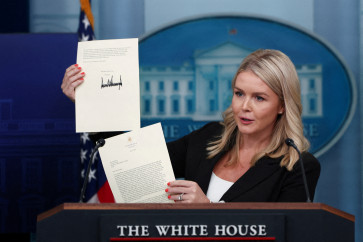Popular Reads
Top Results
Can't find what you're looking for?
View all search resultsPopular Reads
Top Results
Can't find what you're looking for?
View all search resultsJISDOR: Toward better reference rate practices
The opportunity to generate a more liquid market is also greater, as JISDOR would likely drive a more credible pricing reference.
Change text size
Gift Premium Articles
to Anyone
W
ith the blueprint for money market development (BPPU) 2025 launched approximately one month ago, Bank Indonesia (BI) encourages a better reference rate for the Indonesian foreign exchange (FX) market. The meeting of BI’s Board of Governors (RDG) in January 2021 decided to strengthen the Jakarta Interbank Spot Dollar Rate (JISDOR), which takes effect on April 5, 2021. This signals a serious effort to accelerate the vision for money market deepening.
JISDOR serves as a reference rate that represents the spot FX rate of the US dollar against rupiah in the interbank FX market, including transactions between domestic banks and offshore banks. “Spot”, in turn, is a basic form of the FX transaction. A call for a “dollar spot” would mean a sale or purchase of rupiah against US dollar through which the settlement date is at least two days following the transaction, including ones settled on the same day (“today”) and one day later (“tomorrow”).
Because of the simplicity of the transaction, the volume of the spot dominates the daily exchange. Hence, the spot rate is representative of the FX market. JISDOR is evidence of BI’s direct involvement in terms of greater monetary stability and market deepening.
BI has decided to improve the design and production of JISDOR via two measures. First, the market observation time (“window time”) will be extended. This means that BI will observe the interbank FX market to render daily JISDOR data for a longer period. JISDOR previously captured spot transactions between 8 a.m. and 9:45 a.m. (GMT+7 or West Indonesia time), and that will be extended to between 8 a.m. and 4 p.m.
Second, as a consequence of the window time extension, the JISDOR publication hour will be moved from 10 a.m. to 4:15 p.m. Subject to the market operational hours during the pandemic, the enhanced JISDOR will be available at 3:15 PM every business day through BI’s official website, with the window time between 9 a.m. and 3 p.m.
The extension of the timing ensures that JISDOR accounts for full-day spot transactions. The market can then rely more on JISDOR, because it captures a more complete picture of “what actually happens” in the market, from the opening until the closing of domestic trading hours. This development will be beneficial for the comprehensiveness of market analysis and exchange rate projections. At best, it pays off with the improvement of business decision quality as well as policies for relevant authorities, including the genuine interest of BI in functioning stable monetary and financial systems.
The reference rate is substantial for the FX market in many ways. A more reliable and robust reference rate will benefit the market with more confidence, especially for those who are contracting under the arrangements of JISDOR. The opportunity to generate a more liquid market is also greater, as JISDOR would likely drive a more credible pricing reference. Moreover, a better-conceived reference rate would bring a better measure for market participants to avoid disruption, such as market abuse.
We can also expect an improvement in the derivatives market following the availability of a strengthened spot rate. The rate for FX derivatives, such as forward, non-deliverable forward and swap, would be affected by a more comprehensive spot rate as the theoretical baseline. This will affect the level of confidence for market participants to increase the engagement in the derivatives market.
Just as meaningful as the JISDOR enhancement is for the functioning of the financial market, it is also important for the improvement of the overall economy. The development of the FX market will have a multiplier effect on other economic sectors. From a wider perspective, the reference rate does not only serve FX market participants but also the greater economic base, including the public. Exporters and importers, for example, which use reference rates to decide on allocations of foreign currency and whether to engage in FX hedging to mitigate exchange rate risks, would also feel the benefits.
For an emerging, open economy like Indonesia, having a robust reference rate is a prerequisite to moving toward the advancement of the market. JISDOR is an important guide for market expectations. For an economy with a free-floating rate regime, their expectation about the FX value is a substantial determinant for the exchange rate stability. Having a more thorough JISDOR will directly help BI’s ability to respond to financial fragilities.
BI once again presents a strong commitment to the money market development by making JISDOR more reliable and robust. This decision also shows BI’s readiness to moving forward and helps to align JISDOR with global best practices.
The implementation of the strengthened JISDOR framework must not only be sound in its technicalities but also should be supported by nontechnical matters. Stronger collaboration with stakeholders, including domestic and international regulators, and continuous encouragement of private entities in the spot market are required to realize all the benefits.
The enhancement of JISDOR should be followed by structural changes. Market structures and both regulatory and institutional arrangements still ought to be improved. The innovative money market instruments, the wider use of collateral on derivative markets and the move to centrally clear standardized over-the-counter derivatives transactions may add to the development of JISDOR.
Should there be such further structural transformation, it is fortunate to have well-developed reference rate practices in place that can contribute to overall market development. One step for a giant leap.
***
The writer is a legal affairs staffer, Bank Indonesia. The views expressed are those of the author.










